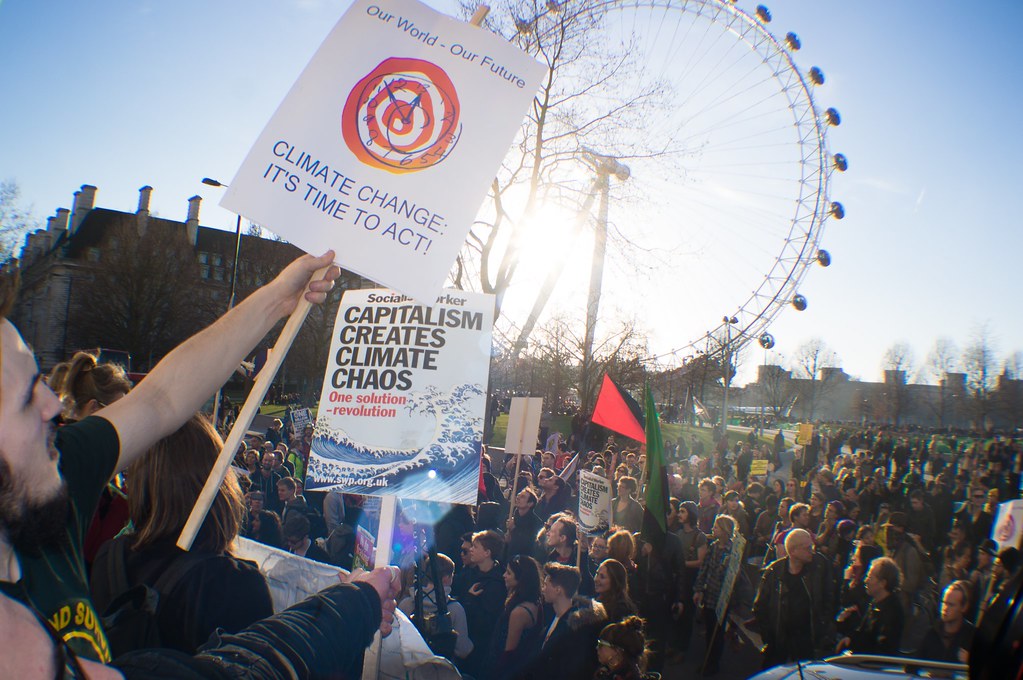
Beyond Borders and Climate Chaos: The UK’s Defining Election Moment
By Rosemary Harris
In this pivotal “year of elections” the UK, alongside the US, India, the EU, and over 50 other countries, heads to the polls. In the midst of the hottest spring and the expected wettest summer on record in the UK, party activists are knocking on doors to get out the vote for July 4th.
But that’s not all. There are deadly floods in Germany, extreme weather events in South Africa, and schools are shutting in India due to a severe heatwave. More deadly weather phenomena are undoubtedly going to take place before this election is over.
And while people experience drought, floods, heatwaves, crop failure and other impacts of climate breakdown, forcing them to flee their homes, in the UK politicians compete in a race to the bottom on migration. We know that climate breakdown may result in hundreds of millions of climate migrants by 2050.Yet the political discourse has devolved into a contest of who can be the least compassionate. The focus is on who can build the highest walls, who can shut down the most legal immigration routes, and who can make the most deals with countries with questionable human rights records.
Right-wing populist Reform party leader, Nigel Farage, a vocal supporter of Donald Trump, has declared this the “immigration election” while sitting on a platform approaching outright climate denial.
Immigration is often euphemistically talked about as “the small boat problem.” These “small boats” are in fact filled with people who have been shut out of the ever-dwindling legal routes offering safe passage for those fleeing war, famine, drought or floods. Every day, people are so desperate to reach the UK that they risk their lives on a perilous crossing from France, a crossing that has claimed the lives of over 400 people since 1999.
Media and politicians prefer to talk about this than the UK’s responsibility for the climate crisis.
The UK ranks fourth in historic responsibility for carbon emissions. In Oil Change International’s recent Troubled Waters report we found that the UK has the biggest potential climate impact of all North Sea countries from licensed, undeveloped oil and gas fields and is way off track in aligning policies with the Paris Agreement.
It is easier to demonise migrants than to address the fact that the UK, once a Global North leader in climate action, has lost its way. Over the last year, the incumbent Conservative Government has pushed back or abandoned key targets to reduce fossil fuel consumption including the end of selling new petrol and diesel cards, phasing out gas boilers, and new energy efficiency regulations in homes.
After July 4th, a new government will need to make urgent climate decisions with domestic and international impact. They will need to act on the upcoming energy bill crisis as we head into autumn. They must prepare for a major international climate conference, COP29 in Azerbaijan, which is later this year. Then they will need to submit a Nationally Determined Contribution (a climate action plan to cut emissions and adapt to climate impacts) by March 2025. There is also the issue of deciding whether to continue to defend legal challenges from civil society groups, Client Earth and Uplift, over their net zero strategy and the decision to grant permission to the highly controversial Rosebank gas field.
The public, unions, and climate & environment groups are making it clear that they want to hear parties’ plans to deal with the challenges ahead:
🌍It’s #WorldEnvironmentDay & one of the key themes is land restoration. It’s so great that this is getting a mention on a world wide stage but where was it in last night’s #GeneralElection #LeadersDebate?
It’s time our leaders address the elephant (hawk moth) in the room! 🧵 pic.twitter.com/xyLTyXtzPi
— Wild Card (@wildcardrewild) June 5, 2024
“Instead of giving soundbite answers and posturing to the public, we really needed to hear the substance of how both parties intend to meet the UK’s climate and nature targets” – Rosie Downes of Friends of the Earth, on last night's leaders' debate. https://t.co/KDr5tdTAIN
— Friends of the Earth (@friends_earth) June 5, 2024
New poll finds most people think main parties falter on nature and climate crises in the run up to General Election https://t.co/iWq0SSBeIr
— Jonathon Porritt (@jonathonporritt) June 6, 2024
We can't wait to hear all about @RishiSunak and @Keir_Starmer's plans on transitioning to green steel and green energy. Will it be a proper thought out funded plan or will it be workers and communities on the scrap heap? #ITVDebate #generalelection #NoBanWithoutAPlan pic.twitter.com/ox6XXXsl8M
— Unite For A Workers' Economy (@UniteEconomy) June 4, 2024
Despite only cursory mention of climate change in the election so far, climate breakdown is the defining issue of our time, and requires serious, long-term thinking combined with rapid policy action. It also requires compassion for the people already suffering with the impacts of a problem they did not cause, who will be forced to leave their homes and their homelands as they become uninhabitable.
At a time when people are crying out for hope, we should be able to look to our political leaders for genuine, positive ideas on how to address this crisis. Instead, in the UK, we are faced with the spectacle of our most senior politicians fighting over who can be the most cruel and uncaring towards people from outside our small island.
As the crisis deepens, we not only need radical and bold policies to transition our energy system away from fossil fuels. We also need to create safe, accessible and compassionate migration routes for those displaced. And in this general election it would be a welcome change to see leaders who seem up to the job.
